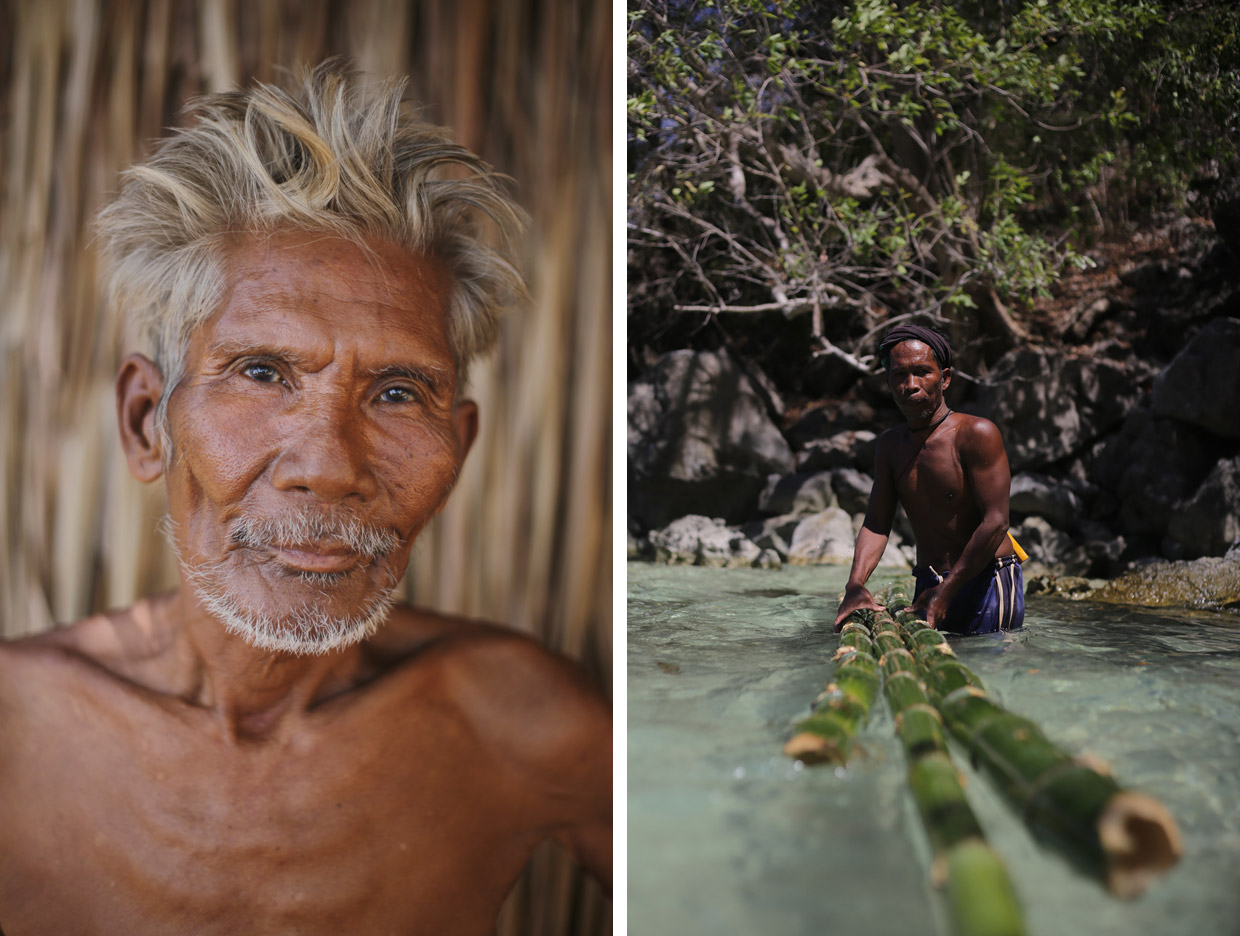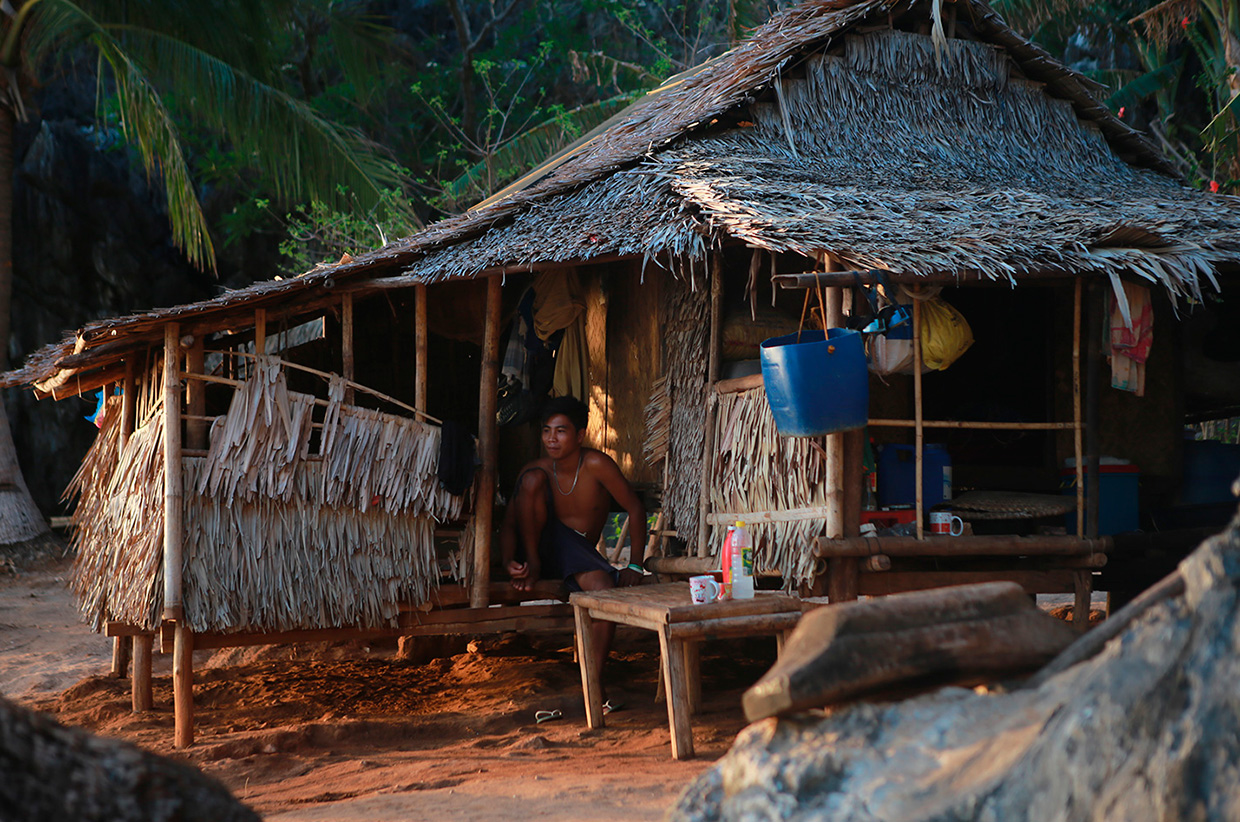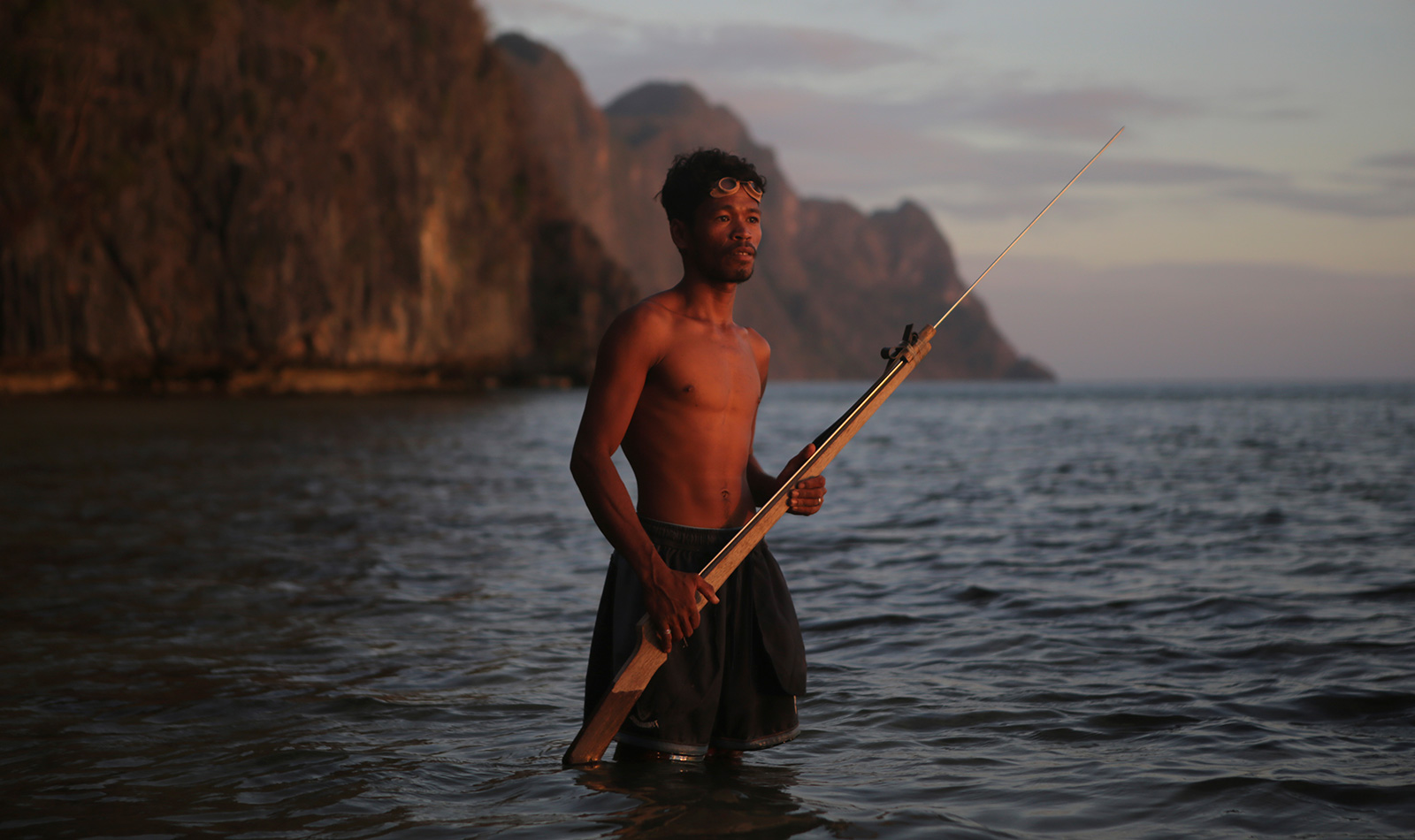Survival in Paradise
Learning a Lost Normal on Coron Island
Story & Photography by Terence Ver Angsioco // Written by Megan Brownrigg
Filipino Photographer Terence Ver Angsioco spends 66 days on Coron Island to meet the tribe who own an ocean.
‘We forgot the serving spoon.’
Wielding a machete isn’t the response I expect from Chef Hilven, but he’s a solutions kind of guy. To the crackled blare of Bob Marley’s Give Me Love, he aggressively starts hacking away at a tube of bamboo. Splinters slice into the sand like drunk arrows, but Hilven’s cavalier cool suggests this is how he always sources his cutlery. He’s well aware that his heroism is being caught on camera, but I’m happy to film and swoon. My new bro makes something out of nothing daily. He cuts problems down to size. Finds wealth in weird places. Today’s win is the abandoned cove he’s brought us to – the set for our latest episode of Island Cooking. The sand strip is guarded by sheer limestone cliffs that lean over us like policemen. Clutches of forest sprout from the rock, suspended in mid-air, peering with green jealousy at the ocean below. These open waters braid inlets through Coron Island’s cliffs, widening into lagoons inland – teal lakes considered sacred by the Tagbanua people. They’re also wrapped in tribal stories, and their exact locations are kept secret from outsiders. It’s a hell of a back yard for Hilven.
The chef crouches over our clay pot like a kidney bean. I turn our blackened fish across the burning twigs, which click as they grill. Naked flames mash with midday sun to bake us both in the haze. But our Instagram Live is rolling and we act cool as cucumbers, playing Bob Marley on LOOP. ‘HELLO and welcome to another episode of island cooking with your hosts Terencito and Chef Hilven!’ I sing into my iPhone. ‘Today’s special is Sigang – fish with onion, mango, ginger, and tamarind leaves: no additives!’ Hilven cuts a cashew nut for its sour flesh and I spin round to give a panorama of our location. Behind us, Coron Island’s waters sit glassy still, as if they could never be splintered by wind.
This sea tells lies. During the typhoon that first let me explore this place, I’ve watched the Sulu Sea build walls before smashing into liquid shards. As a boy, I’d sail past the Filipino island on family holidays, thinking that its towering mountains looked like the back of a dragon. I’d see its tiny huts sitting on thin lines of white sand and wonder who lived in them. But everyone knows that Coron Island, and its surrounding ocean, belong to the Tagbanua tribe. You need the permission of tribal elders to step foot on its shores. I’d turn 39 before earning that privilege.



Thanks to a social enterprise that partners with the Tagbanuas, I was lucky enough to visit Coron Island in November 2019. There was no big moment of meeting the tribe. They’re modern people. But, when a storm stopped anyone else from accessing the island, I got some alone time with them. As a city boy from Makati, I assumed that we were all going to run out of supplies and die in the typhoon. I gallantly shared my eggs, instant noodles, and rum with the Tagbanuas, having no concept that these guys can catch their own food whenever they want. Still, the popular taste of MSG got me an invite to the bar. I spent an evening watching the tribe’s courtship dance of suring. The man’s goal is to face the woman, who will nimbly twist her hands above her head, like a gentle jazz hand, whilst shuffling her feet and keeping her face turned away from him. My time to shine came when I was invited to win one elderly woman’s heart. It was a brief affair; my quickest boxing moves proved nothing to her slow but perfectly timed pirouettes. Learning that she was happily married afterwards iced my bruised ego.
***
Later that evening, I battled collective boredom with my Bluetooth speaker. Taking a risk on my street cred, I played criminally cheesy Filipino songs to my new friends. There’s something about our country’s pop music that is full of real feeling but also unapologetically uncool. Maybe it’s the ardour of a poorer nation putting our problems into songs. What I did not know is that the Tagbanua tribe would go completely mad for the karaoke classics. Loved them. Singing and dancing together in the storm, we belted out notes of hope and heartache together, and I felt at home.
In all the silly that night, a serious moment did come. A village elder, called an Apo (grandad), suddenly got emotional. He started telling me his dream for his grandson, Gilbert, to finish school. I learned that someone finishing school in the tribe is very, very rare and even if it happens, things will be difficult. The Tagbanuas welcomed me and my terrible playlists with open arms but they rarely receive the same hospitality, even from their neighbouring islands. The tribe walk barefoot, they’re darker, and they get looks when they cross to town. This Apo knew that his grandson might never finish school. Drunk and passionate, I wanted to promise I could fix this, that I could help Gilbert. But such promises aren’t a good idea, and these things aren’t about money. Instead, we kept dancing together. I kept taking photos.



When the weather calmed a few days later, I left the Tagbanuas. Chef Hilven is in my pictures from that night in the bar, but I didn’t know his name back then. Despite being touched by the tribe, these people were still strangers in my memory. This stayed the case for months, until I packed a bag and asked permission to go back to Coron Island. I wanted to know more about the people I’d danced with in that storm. This tribe who owned an ocean.
***
My second visit to the island lasted 66 days. During this time, I learned that the Tagbanuas are masters of their universe. Living in an ancestral domain, free of government jurisdiction, they’re everything in one: spearfishers, farmers, foragers, even their own mechanics. The men fish together, sharing one boat and the cost of gasoline. The women harvest the wild yams together in the mountains. No-one overfishes or overharvests, and there’s an unwritten rule that if someone has too much of something, they’ll share it. When they aren’t working, the Tagbanuas kick back together. On long afternoons, the tribe will watch old movies on their shared VCD player. Sometimes they’ve watched that same movie 15 times already, but it never loses its magic. The tribe also fight like family. When one elder gets bored of smoked fish, he swaggers into the ocean with his spear, sulkily stabbing his own fresh catch.
Initially blindsided by the idea of ‘paradise’, it took me time to learn that the tribe’s civil freedom didn’t come easy to them. These people who own an ocean are warriors of their island’s well-being – warriors who fought fiercely for their rights. Back in the ‘80s, Coron was exploited by investors for the swifts’ nests in its caves and for the fish in its waters. The sacred lakes were poisoned with cyanide, and families were evicted from the coves they’d lived in for generations. The Tagbanuas were at serious risk of losing their home until they were finally awarded their Certificate of Ancestral Domain Claim (CADC) under the Indigenous People’s Rights Act in 2001. With its intimate network of lagoons, Coron became the first territory in the world where rights over the ocean were recognised. Today, the Tagbanuas don’t need anyone to survive apart from each other.
On my second visit, noticing the tribe’s self-sufficiency, I felt silly for arriving with half a supermarket, including tinned tuna. To hoover up the evidence, I started using up ingredients by presenting a fake cookery show with my iPhone. Although I speak the same language as the Tagbanuas, I recorded the episodes in English for my family and friends. My corny lines and Bob Marley soundtrack attracted the curiosity of Chef Hilven, who also speaks the language. Hilven was so shy at first that I didn’t expect a bromance to blossom. His strong bushy eyebrows and slight moustache reveal his maturity at 21, but they don’t hide his inquisitive baby face, or his habit of quickly looking away when he’s unsure. His eyes are full of sea salt; their roasted nut brown conveys his warmth. But they’re steely too, as if they’ve never quite rinsed out the ocean. With his powerful ability to cross cultures, Hilven asked to be my co-host. I was buzzing.



I soon learned that Hilven’s shyness has limits. On his afternoons off, he was perfectly happy to showcase his flawless abs by posing for photos in the sea’s shallows. He would wag his head with a boyish smile if he knew that a punchline was in reach. But Hilven is also an amazing formally trained chef. Together we made everything from vegan bowls to fish curry and pumpkin coconut pancakes (which we both admitted were terrible). When we weren’t filming or cooking, we’d sing karaoke or talk. Trouble is, Hilven’s big-hearted ease was so easy to be around that he’d lulled me into thinking he was a guy without problems. But our chats dug up that Hilven had never got to finish school. He talked a lot about wishing he had. He’s such a strong spearfisher that his cove needs him in the ocean. One afternoon, perched on a paddleboard, I got to witness why.
Chef Hilven’s freediving is proof that the Tagbanuas are superhuman. That guy was like a flying ballerina underwater. Spear in hand, Hilven’s goofiness evaporated as his lithe body hit depths of more than 30ft in one breath. In the open ocean, he reached a new meditative state, mentally and spiritually exploring an uncharted world. Without jarring its serenity, he pointed his spear at a fish and pierced it with one body shot. I didn’t expect him to bite into the fish’s brain afterwards. Its tail spasmed as a cloud of red blood released into the water. A deadly love story with tantalising visuals, spearfishing is the greatest survival show on Earth. Watching Hilven in the ocean was like seeing Michael Jordan play basketball and thinking I want to play like Mike.
As the Tagbanua intern, I was up for trying to hunt my own food, even if it involved propelling myself underwater with a gun I didn’t know how to use. Hilven approached the role of teacher by pointing to a rock at the ocean’s bottom and saying ‘Go there, sir!’ Although I’d practised a bit of freediving closer to shore, this tuition from Hilven felt quite hands off. His shouts of ‘Sir, just relax! Relax!’ also didn’t help. But I did my breathing exercises, harnessed a scrap of calm, and dived. I gently kicked my body down, down and down, feeling elated at what I was doing. Down, down, down, then, NO, fuck fuck fuck I can’t do it! Paralysed by fear halfway, I swallowed a mouthful of seawater and choked my way back to the surface. Hilven was in creases. ‘What are you doing, sir?’ he cried in hysterics. ‘You need to relax!’




‘That’s impossible!’ I spluttered in anger. ‘You’re pushing me too hard!’ Hilven held his stomach in glee. Taking confidence from his complete lack of concern, I told myself that I wouldn’t die and I didn’t need air. I headed back down, this time keeping a steady direction with minimal thinking. Down, down, down. Down. Down. Oh my god! It’s working! Suddenly, I was in my own Zero to Hero movie and my life arc was peaking OUT. Spotting a sleepy fish in my euphoria, I carefully cocked the speargun so it didn’t backfire into my crotch – one thing Hilven had warned me about. My head screamed in silent excitement when I hit it. I pushed to the water’s surface with my tiny fish, yelping ‘I CAN FEED MYSELF!’ Hilven found my euphoria just as hilarious as my neardrowning. The underwater world is a baptism of fire.
***
Our spearfishing harvest is what brings us to the abandoned cove, to cook our catches. But after filming our Insta-Live, the glint in Hilven fades for a moment. He tells me he’s going off fish and just wants to eat spaghetti. Although I’ve seen him rule the ocean today, I’m reminded that Hilven is at home, not in paradise. Watching him freedive through cathedrals of sunlit water might look staggeringly spiritual, but it’s also an act of survival. Just like me, Hilven longs for access to new worlds. He wants to meet his favourite actor in Manila, to cook in urban hotels, to go to school. Knowing I can’t promise him any of this, I distract Hilven with comments from today’s Island Cooking episode. I groan as endless exclamations of how much everyone loves Chef Hilven fill my screen. He knocks me out with another single sentence: ‘I can’t believe foreigners care about me.’ The sun dips to a gluey amber as he pours salt from a shell over our meal. ‘Wow. It feels so good to be appreciated!’ My mind floats uncomfortably in what he’s said, but Hilven breaks into a proud toothy smile, proffering his handmade bamboo spoon to serve our food. This young Tagbanua lives off the gifts of his island. Problems pass across his mind, like shifting clouds, and he goes on living.
First published in Sidetracked Volume 21
Story & Photography by Terence Ver Angsioco// @terencever // jaggedperspective.com
Written by Megan Brownrigg // @brownriggmegan



